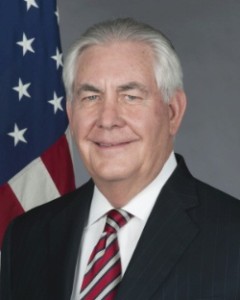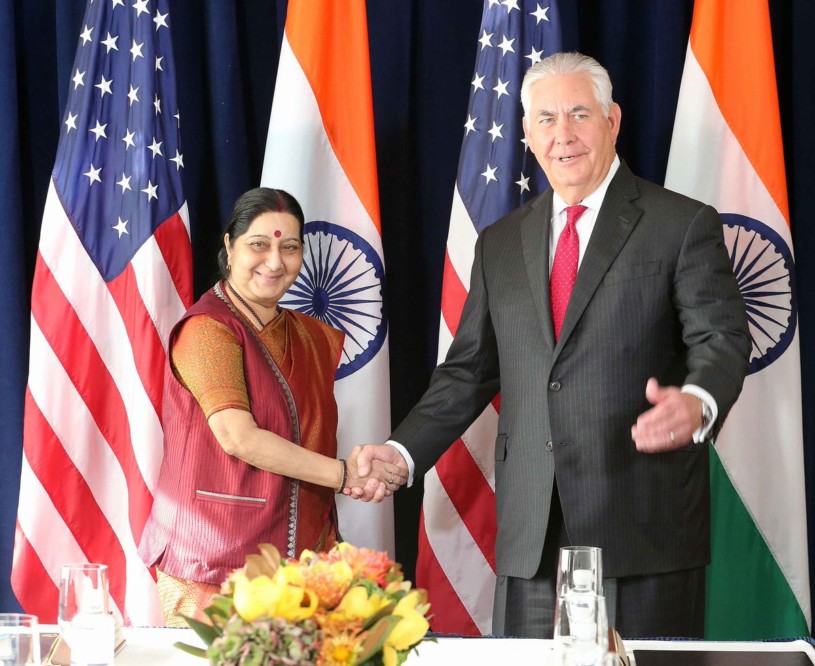By Aroonim Bhuyan
New Delhi–Prior to his maiden visit to India in his official capacity, US Secretary of State Rex Tillerson has made clear Washingtons position on key geopolitical and strategic matters pertaining to the Indo-Pacific and South Asian regions, saying the “Trump administration is determined to dramatically deepen ways for the United States and India” to further their strategic partnership that is heading for “strategic convergence” and put China and Pakistan on notice that it intended to “do what is needed” to support India.
“In this period of uncertainty and somewhat angst, India needs a reliable partner on the world stage. I want to make clear: with our shared values and vision for global stability, peace, and prosperity, the United States is that partner,” Tillerson said categorically while making a major policy statement at the Centre for Strategic and International Studies (CSIS) in Washington DC on Wednesday.

While asserting that China’s “provocative actions” went against the international law and norms that the US and India stood for, Tillerson made it clear that Washington expected Pakistan to take “decisive action” against terrorist groups operating within its territory.
“China, while rising alongside India, has done so less responsibly, at times undermining the international, rules-based order even as countries like India operate within a framework that protects other nations’ sovereignty,” the Secretary of State, who will be visiting New Delhi next week, said while delivering an address on ‘Defining Our Relationship with India for the Next Century’.
The statement assumes significance in the wake of the 73-day standoff between Indian and Chinese troops in the Doklam region of Bhutan. New Delhi and Beijing eventually withdrew their troops from the region on August 28 just days ahead of Prime Minister Narendra Modi’s visit to China for the annual BRICS (Brazil, Russia, India, China, South Africa) Summit.
In his remarks, Tillerson also referred to China’s aggressive stance in the South China Sea region and said the US and India would work together for the security architecture in the Indo-Pacific region.
“China’s provocative actions in the South China Sea directly challenge the international law and norms that the United States and India both stand for,” he said.
“The United States seeks constructive relations with China, but we will not shrink from China’s challenges to the rules-based order and where China subverts the sovereignty of neighbouring countries and disadvantages the US and our friends.”
Tillerson said that India and the US “should be in the business of equipping other countries to defend their sovereignty, build greater connectivity, and have a louder voice in a regional architecture that promotes their interests and develops their economies”.
“This is a natural complement to India’s Act East policy,” he stated.
In this context, he also said that the US, India and Japan were “already capturing the benefits of our important trilateral engagement” and said “India and the United States must foster greater prosperity and security with the aim of a free and open Indo-Pacific. The Indo-Pacific – including the entire Indian Ocean, the Western Pacific, and the nations that surround them – will be the most consequential part of the globe in the 21st century.”
These words will come as music to New Delhi’s ears ahead of Modi’s visit to the Philippines next month for the Association of Southeast Asian Nations (Asean) and East Asia Summits.
Tillerson’s remarks also came amid Chinese President Xi Jinping’s assertion at this week’s National Congress of the Communist Party of China that Beijing would never give up its “legitimate rights and interests”.
Despite US President Donald Trump’s new South Asia Strategy that sees Pakistan as an important partner, Tillerson made no bones about the fact that Washington expected Islamabad to take strong action against terror.
“We expect Pakistan to take decisive action against terrorist groups based within their own borders that threaten their own people and the broader region,” he said.
“In doing so, Pakistan furthers stability and peace for itself and its neighbours, and improves its own international standing.”
Tillerson also referred to the US’ designation of the Hizbul Mujahideen as a foreign terrorist organisation and said this was “because the United States and India stand shoulder-to-shoulder against terrorism”.
“States that use terror as an instrument of policy will only see their international reputation and standing diminish,” he said, leaving to no one’s imagination which country he was referring to.












